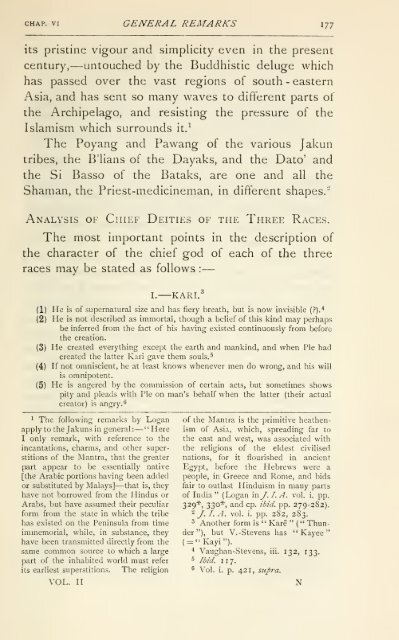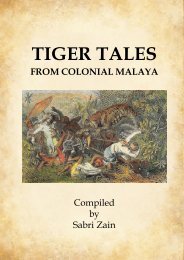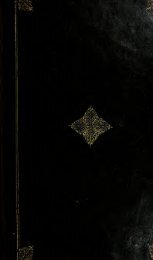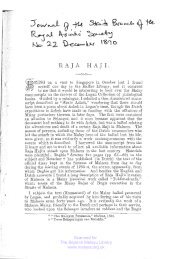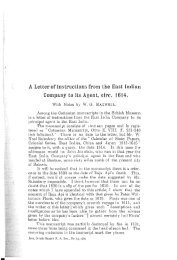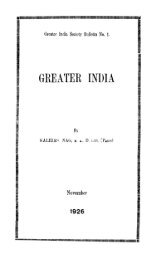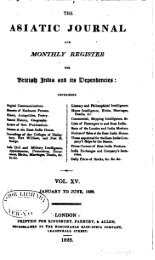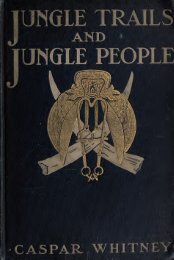- Page 1 and 2:
^w*(jws^;
- Page 3:
THE UNIVERSITY LIBKAHY UNIVERSITY O
- Page 9:
PAGAN RACES OF THE MALAY PENINSULA
- Page 12 and 13:
CONTENTS PART IV.—LANGUAGE CHAPTE
- Page 14 and 15:
LIST OF ILLUSTRATIONS NEGRI SEMBILA
- Page 17:
RELIGION. PART III.
- Page 20 and 21:
BIRTH-CUSTOMS AND BELIEFS invocatio
- Page 22 and 23:
BIRTH-CUSTOMS AND BELIEFS notches i
- Page 24 and 25:
BIRTH-CUSTOMS AND BELIEFS however,
- Page 26 and 27:
^ BIRTH-CUSTOMS AND BELIEFS The pro
- Page 28 and 29:
BIRTH-CUSTOMS AND BELIEFS reason gi
- Page 30 and 31:
BIRTH-CUSTOMS AND BELIEFS though th
- Page 32 and 33:
14 BIRTH-CUSTOMS AND BELIEFS part h
- Page 34 and 35:
i6 BIRTH-CUSTOMS AND BELIEFS part h
- Page 36 and 37:
i8 BIRTH-CUSTOMS AND BELIEFS part h
- Page 38 and 39:
20 BIRTH-CUSTOMS AND BELIEFS part h
- Page 40 and 41:
22 BIRTH-CUSTOMS AND BELIEFS part h
- Page 42 and 43:
24 BIRTH-CUSTOMS AND BELIEFS part i
- Page 44 and 45:
26 BIRTH-CUSTOMS AND BELIEFS part i
- Page 46 and 47:
CHAPTER II. Maturity Customs and Be
- Page 48 and 49:
30 MATURITY CUSTOMS AND BELIEFS par
- Page 50 and 51:
32 MATURITY CUSTOMS AND BELIEFS par
- Page 52 and 53:
34 MATURITY CUSTOMS AND BELIEFS par
- Page 54 and 55:
36 MATURITY CUSTOMS AND BELIEFS par
- Page 56:
38 MATURITY CUSTOMS AND BELIEFS par
- Page 59 and 60:
SAKAI OF PERAK 39 latter, however,
- Page 61 and 62:
SAKAI OF PERAK 41 Semang man tattoo
- Page 63 and 64:
'\ l^ ^ ' nJ rt o - ~
- Page 65 and 66:
SAKAI OF PERAK 43 pricking the skin
- Page 67 and 68:
acS" 4 'rf
- Page 69 and 70:
CHAP. II SAKAI OF PERAK 45 red body
- Page 71 and 72:
CHAP. II SAKAI OF PERAK 47 Elsewher
- Page 73 and 74:
CHAP. II SAKAI OF PERAK 49 plants i
- Page 75 and 76:
CHAP. II SAVAGE MALAYS OF SELANGOR
- Page 77 and 78:
MALAYAN SEA-GYPSIES 53 tribe died o
- Page 79 and 80:
CHAPTER III. Marriage Customs and B
- Page 81 and 82:
CHAP. Ill GENERAL REMARKS 57 while
- Page 83 and 84:
CHAP. Ill NEGRITOS OF KELANTAN 59 P
- Page 85 and 86:
Vo/. II. p. 60. h>\(;.\i;i-.ii Saka
- Page 87 and 88:
SAKAI OF PERAK 6i called an example
- Page 89 and 90:
SAKAI OF PERAK 63 by Vaughan-Steven
- Page 91 and 92:
Vol. 11. /. 64. Cemi/i. New LY-MAKK
- Page 93 and 94:
CHAP. Ill SAKAI OF PERAK 65 enough.
- Page 95 and 96:
' CHAP. Ill SAKAI OF SELANGOR 67 Be
- Page 97 and 98:
CHAP. Ill SAVAGE MALAYS OF SELANGOR
- Page 100 and 101:
^ o 3-= H H g = .2 n 3 i; £ ^ O S
- Page 102 and 103:
72 MARRIAGE CUSTOMS AND BELIEFS par
- Page 104 and 105:
74 MARRIAGE CUSTOMS AND BELIEFS Pen
- Page 106 and 107:
76 MARRIAGE CUSTOMS AND BELIEFS par
- Page 108 and 109:
7?. MARRIAGE CUSTOMS AND BELIEFS pa
- Page 110 and 111:
— 8o MARRIAGE CUSTOMS AND BELIEFS
- Page 112 and 113:
82 MARRIAGE CUSTOMS AND BELIEFS i'A
- Page 114 and 115:
84 MARRIAGE CUSTOMS AND BELIEFS par
- Page 116 and 117:
86 MARRIAGE CUSTOMS AND BELIEFS i'a
- Page 118 and 119:
88 MARRIAGE CUSTOMS AND BELIEFS par
- Page 120 and 121:
90 BURIAL CUSTOMS AND BELIEFS part
- Page 122 and 123:
92 BURIAL CUSTOMS AND BELIEFS i'art
- Page 124 and 125:
94 BURIAL CUSTOMS AND BELIEFS part
- Page 126 and 127:
96 BURIAL CUSTOMS AND BELIEFS part
- Page 129 and 130:
CHAP. IV SAKAI OF PERAK 97 of the B
- Page 131 and 132:
CHAP. IV SAKAl OF SELANGOR 99 hair
- Page 133 and 134:
CHAP. IV SAVAGE MALA YS OF NEGRI SE
- Page 135 and 136:
CHAP. IV SAVAGE MALA VS OF NEGRI SE
- Page 137 and 138:
CHAP. IV SA VAGE MALA YS OF NEGRI S
- Page 139 and 140:
CHAP. IV SAVAGE MALAYS OF SELANGOR
- Page 141:
iSaam^i^ Besisi Soul-Wallet. Skeai
- Page 144 and 145:
BURIAL CUSTOMS AND BELIEFS there wa
- Page 146 and 147:
BURIAL CUSTOMS AND BELIEFS sympathy
- Page 148 and 149:
114 BURIAL CUSTOMS AND BELIEFS disa
- Page 151 and 152:
CHAP. IV SAVAGE MALAYS OF JOHOR iiy
- Page 153 and 154:
CHAPTER V. Music, Songs, and Feasts
- Page 155 and 156:
CHAP. V GENERAL REMARKS 119 worn by
- Page 157 and 158:
CHAP. V NEGRITOS OF KEDAH 121 among
- Page 159 and 160:
Skeat CoUcctioii. Skmang Jews'-har]
- Page 161 and 162:
NEGRITOS OF KEDAH which is by no me
- Page 163 and 164:
NEGRITOS OF KEDAH 125 itself was bo
- Page 165 and 166:
NEGRITOS OF KEDAH 127 forward and s
- Page 167 and 168:
CHAP. V NEGRITOS OF KEDAH 129 The f
- Page 169 and 170:
CHAP. V NEGRITOS OF PERAK 131 as th
- Page 171 and 172:
NEGRITOS OF PERAK 133 sort of polka
- Page 173 and 174: CHAP. V SAKAI OF PERAK 135 made of
- Page 175: P'ol. 11, p. 136. SAKAI MEX PLAVINf
- Page 178 and 179: 138 MUSIC, SONGS, AND FEASTS part m
- Page 181 and 182: CHAP. V SAVAGE MALAYS OF SELANGOR 1
- Page 183 and 184: CHAP. V SA VAGE MALA YS OF SELANGOR
- Page 185 and 186: Semang ; SA VAGE MALA YS OF SELANGO
- Page 187: 1^ V'"'^ \ i^:.: ix>-*»
- Page 190 and 191: 146 MUSIC, SONGS, AND J-'EASTS vart
- Page 192 and 193: To/. //. /. 147. A' Xami, thk Laie
- Page 194 and 195: MUSIC, SONGS, AND FEASTS The Elepha
- Page 196 and 197: ISO MUSIC, SONGS, AND FEASTS A man
- Page 198 and 199: 152 MUSIC, SONGS, AND FEASTS part h
- Page 200 and 201: 154 MUSIC, SONGS, AND FEASTS part r
- Page 202 and 203: 156 MUSIC, SONGS, AND FEASTS And se
- Page 204 and 205: 158 MUSIC, SONGS, AND FEASTS pari i
- Page 206 and 207: i6o MUSIC, SONGS, AND FEASTS The Ga
- Page 208 and 209: i62 MUSIC, SONGS, AND FEASTS part h
- Page 210 and 211: i64 MUSIC, songs;AND FEASTS part ii
- Page 212 and 213: 1 66 MUSIC, SONGS, AND FEASTS tART
- Page 214 and 215: 1 68 MUSIC, SONGS, AND FEASTS part
- Page 216 and 217: I70 MUSIC, SONGS, AND FEASTS part h
- Page 218 and 219: Group of Abukigines with Fiddles, C
- Page 220 and 221: 172 MUSIC, SONGS, AND FEASTS part h
- Page 222 and 223: 174 NATURAL RELIGION AND FOLK-LORE
- Page 226 and 227: 178 NATURAL RELIGION AND FOLK-LORE
- Page 228 and 229: i8o NATURAL RELIGION AND FOLK-LORE
- Page 230 and 231: 1 82 NATURAL RELIGION AND FOLK-LORE
- Page 232 and 233: 1 84 NATURAL RELIGION AND FOLK-LORE
- Page 234 and 235: i86 NATURAL RELIGION AND FOLK-LORE
- Page 236 and 237: i88 NATURAL RELIGION AND FOLK-LORE
- Page 238 and 239: I90 NATURAL RELIGION AND FOLK-LORE
- Page 240 and 241: 192 NATURAL RELIGION AND FOLK-LORE
- Page 242 and 243: 194 NATURAL RELIGION AND FOLK-LORE
- Page 244 and 245: 196 NATURAL RELIGION AND FOLK-LORE
- Page 246 and 247: 198 NATURAL RELIGION AND FOLK-LORE
- Page 248 and 249: 200 NATURAL RELIGION AND FOLK-LORE
- Page 250 and 251: 202 NATURAL RELIGION AND FOLK-LORE
- Page 252 and 253: 204 NATURAL RELIGION AND FOLK-LORE
- Page 254 and 255: 2o6 NATURAL RELIGION AND FOLK-LORE
- Page 256 and 257: 2o8 NATURAL RELIGION AND FOLK-LORE
- Page 258 and 259: 2IO NATURAL RELIGION AND FOLK-LORE
- Page 260 and 261: 212 NATURAL RELIGION AND FOLK-LORE
- Page 262 and 263: 214 NATURAL RELIGION AND FOLK-LORE
- Page 264 and 265: 2i6 NATURAL RELIGION AND FOLK-LORE
- Page 266 and 267: 2i8 NATURAL RELIGION AND FOLK-LORE
- Page 268 and 269: 220 NATURAL RELIGION AND FOLK-LORE
- Page 270 and 271: 222 NATURAL RELIGION AND FOLK-LORE
- Page 272 and 273: 224 NATURAL RELIGION AND FOLK-LORE
- Page 274 and 275:
226 NATURAL RELIGION AND FOLK-LORE
- Page 276 and 277:
228 NATURAL RELIGION AND FOLK-LORE
- Page 279 and 280:
CHAP. VI NEGRITOS OF KEDAH 229 sitt
- Page 281 and 282:
CHAP. VI NEGRITOS OF KEDAH 231 to t
- Page 283 and 284:
CHAP. VI NEGRITOS OF KEDAH 233 belo
- Page 285 and 286:
SAKAI OF PERAK 235 the Sakai, and i
- Page 287 and 288:
SAKAI OF PERAK zyj teller of this s
- Page 289 and 290:
SAKAI OF PERAK 239 adze ( = Mai. "
- Page 291 and 292:
CHAP. VI SAKAI {'BLANDAS') 241 thro
- Page 293 and 294:
CHAP. VI SAKAI {'BLANDAS') 243 Ther
- Page 295 and 296:
CHAP. VI SAKAI {' BLANDAS') 245 mus
- Page 297 and 298:
SAKAI OF PERAK 247 darts and eaten)
- Page 299 and 300:
SA KAI (' BLANBA 5 ') demons and di
- Page 301 and 302:
CHAP. VI SAKAI {'BLANDAS') 251 adop
- Page 303 and 304:
CHAP, vr SAKAI {' BLANDAS') 253 the
- Page 305 and 306:
CHAP. VI SAKAI {' BLANDAS') 255 ("
- Page 307 and 308:
CHAP. VI SAK'AI {'BLANDAS') 257 dan
- Page 309 and 310:
CHAP. VI SAKAI {'SENOP) {' BLANDAS'
- Page 311 and 312:
CHAP. VI SAKAI {'BLANDAS') 261 Inte
- Page 313 and 314:
SAKAI OF PERAK 263 fall violently i
- Page 315 and 316:
CHAP. VI SAKAI {' BLANDAS') 265 tra
- Page 317 and 318:
CHAP. VI SAKAI {'BLANDAS') 267 up w
- Page 319 and 320:
SA A'A I (' BLA NDA S ') 269 colony
- Page 321 and 322:
CHAP. VI SAKAI {'BLANDAS') 271 poss
- Page 323 and 324:
CHAP, VI SAKA! {'BLANDAS') 273 The
- Page 325 and 326:
CHAP. VI SAKAI {'BLANDAS') 275 crow
- Page 327 and 328:
CHAP. VI SAKAI {'BLANDAS') 277 yiel
- Page 329 and 330:
CHAP. VI SAKAI {^ BLANDAS') 279 The
- Page 331 and 332:
SAKAI {'BLANDAS') half an unknown l
- Page 333 and 334:
SAKAl (' BLANDAS') 283 seen, are ve
- Page 335 and 336:
CHAP. VI SAKAI {' BLANDAS') 285 and
- Page 337 and 338:
CHAP. VI SAKAI 287 round the mounta
- Page 339:
Markings ok Men kki'kesenting Demon
- Page 342 and 343:
290 NATURAL RELIGION AND FOLK-LORE
- Page 344 and 345:
292 NATURAL RELIGION AND FOLK-LORE
- Page 346 and 347:
294 NATURAL RELIGION AND FOLK-LORE
- Page 348 and 349:
296 NATURAL RELIGION AND FOLK-LORE
- Page 350 and 351:
298 NATURAL RELIGION AI^D FOLK-LORE
- Page 352 and 353:
300 NATURAL RELIGION AND FOLK-LORE
- Page 354 and 355:
302 NATURAL RELIGION AND FOLK-LORE
- Page 356 and 357:
304 NATURAL RELIGION AND FOLK-LORE
- Page 358 and 359:
3o6 NATURAL RELIGION AND FOLK-LORE
- Page 360 and 361:
3o8 NATURAL RELIGION AND FOLK-LORE
- Page 362 and 363:
3IO NATURAL RELIGION AND FOLK-LORE
- Page 364 and 365:
312 NATURAL RELIGION AND FOLK-LORE
- Page 366 and 367:
314 NA TURAL RELIGION AND FOLK-LORE
- Page 368 and 369:
3i6 NATURAL RELIGION AND FOLK-LORE
- Page 370 and 371:
3i8 NATURAL RELIGION AND FOLK-LORE
- Page 372 and 373:
320 NATURAL RELIGION AND FOLK-LORE
- Page 374 and 375:
322 NATURAL RELIGION AND FOLK-LORE
- Page 376 and 377:
324 NATURAL RELIGION AND FOLK-LORE
- Page 378 and 379:
326 NATURAL RELIGION AND FOLK-LORE
- Page 380 and 381:
328 NATURAL RELIGION AND FOLK-LORE
- Page 382 and 383:
330 NATURAL RELIGION AND FOLK-LORE
- Page 384 and 385:
332 NATURAL RELIGION AND FOLK-LORE
- Page 386 and 387:
334 NA TURAL RELIGION AND FOLK-LORE
- Page 388 and 389:
336 NATURAL RELIGION AND FOLK-LORE
- Page 390 and 391:
338 NATURAL RELIGION AND FOLK-LORE
- Page 392 and 393:
340 NATURAL RELIGION AND FOLK-LORE
- Page 394 and 395:
342 NATURAL RELIGION AND FOLK-LORE
- Page 396 and 397:
344 NATURAL RELIGION AND FOLK-LORE
- Page 398 and 399:
346 NATURAL RELIGION AND FOLK-LORE
- Page 400 and 401:
348 NATURAL RELIGION AND FOLK-LORE
- Page 402 and 403:
350 NATURAL RELIGION AND FOLK-LORE
- Page 404 and 405:
352 NATURAL RELIGION AND FOLK-LORE
- Page 406 and 407:
354 ^A TURAL RELIGION AND FOLK-LORE
- Page 408 and 409:
356 NATURAL RELIGION AND FOLK-LORE
- Page 410 and 411:
358 NATURAL RELIGION AND FOLK-LORE
- Page 412 and 413:
36o NATURAL RELIGION AND FOLK-LORE
- Page 414 and 415:
362 NA TURAL RELIGION AND FOLK-LORE
- Page 416 and 417:
364 NATURAL RELIGION AND FOLK-LORE
- Page 418 and 419:
366 NATURAL RELIGION AND FOLK-LORE
- Page 420 and 421:
368 NATURAL RELIGION AND FOLK-LORE
- Page 422 and 423:
370 NATURAL RELIGION AND FOLK-LORE
- Page 424 and 425:
372 NATURAL RELIGION AND FOLK-LORE
- Page 426 and 427:
374 NATURAL RELIGION AND FOLK-LORE
- Page 428 and 429:
376 NA TURAL RELIGION AND FOLK-LORE
- Page 431 and 432:
CHAPTER I. Present State and Future
- Page 433 and 434:
DECAY OF THE DIALECTS 381 ordinary
- Page 435 and 436:
LOCAL SURVIVALS 383 are not entirel
- Page 437 and 438:
SEMANG, SAKAI, AND JAKUN 385 Classi
- Page 441 and 442:
CHAP. I GEOGRAPHICAL DISTRIBUTION 3
- Page 443 and 444:
CHAP. 1 SEMANG AND PANGAN DIALECTS
- Page 445 and 446:
CHAP. I THE SEMANG-SAKAI BORDERLAND
- Page 447 and 448:
SAKAI DIALECTS 393 and though they
- Page 449 and 450:
CHAP. 1 NORTHERN AND CENTRAL SAKAI
- Page 451 and 452:
SOUTHERN SAKAI 397 the Negri Sembil
- Page 453 and 454:
CHAP. 1 EASTERN SAKAI 399 Both thes
- Page 455 and 456:
JAKUN DIALECTS 401 is the most diff
- Page 457 and 458:
JAKUN DIALECTS 403 roam about in th
- Page 459 and 460:
KENABOI 405 that it is not surprisi
- Page 461 and 462:
CHAP. I BEDUANDA AND JAKUN 407 I ap
- Page 463 and 464:
Nail Monkey [sp. ungka) Monkey (s/>
- Page 465 and 466:
SUMMAR V OF CLA SSIPICA TION 4 1 (4
- Page 467 and 468:
CHAP. I LANGUAGE FRONTIERS 413 (2)
- Page 469 and 470:
CHAP. II TABOO LANGUAGE 415 a ficti
- Page 471 and 472:
PRINCIPLE OF TABOO LANGUAGE 417 dia
- Page 473 and 474:
CHAP. II METHODS OF FORMATION 419 (
- Page 475 and 476:
PERIPHRASIS AND METAPHOR 421 obtain
- Page 477 and 478:
CHAP. II ARCHAISMS AND SYNONYMS 423
- Page 479 and 480:
MODIFICATION OF FORM 425 two undeni
- Page 481 and 482:
SPECIAL FORMATIONS 427 methods of m
- Page 483 and 484:
CHAP. II A
- Page 485 and 486:
CHAP. 1 MALA this : there YO-POL YN
- Page 487 and 488:
MALA V LOANWORDS 433 languages, the
- Page 489 and 490:
CHAP. Ill MALAY INFLUENCE EXTERNAL
- Page 491 and 492:
CHAP. Ill GENERICALLY MALAYAN ELEME
- Page 493 and 494:
MON-ANNAM LANGUAGES 439 Mon-Annam E
- Page 495 and 496:
CHAP. Ill DISTRIBUTION OF MON-ANNAM
- Page 497 and 498:
CHAP. Ill RELATIONS OF MON-ANNAM FA
- Page 499 and 500:
CHAP, in HISTORICAL RELATIONS 445 a
- Page 501 and 502:
CHAP. Ill STRUCTURE OF MON-KHMER GR
- Page 503 and 504:
CHAP. Ill MON-A NNAM WORDS 449 prin
- Page 505 and 506:
CHAP. Ill CULTURE WORDS 451 word fo
- Page 507 and 508:
CHAP. Ill RELATION TO MON-ANNAM FAM
- Page 509 and 510:
CHAP. HI SEMANG AND SAKAI NUMERALS
- Page 511 and 512:
CHAP. Ill MON-KHMER NUMERALS 457 Bo
- Page 513 and 514:
TYPICAL SAKAI NUMERALS 459 (or n-e)
- Page 515 and 516:
CHAP. iH DIFFICULTIES OF CLASSIFICA
- Page 517 and 518:
CHAP. Ill UNIDENTIFIED ELEMENTS 463
- Page 519 and 520:
CHAP. Ill UNIDENTIFIED ELEMENTS 465
- Page 521 and 522:
CHAP. Ill LANGUAGE AND RACE 467 Oth
- Page 523 and 524:
CHAP. Ill HISTORICAL INFERENCES 469
- Page 525 and 526:
CULTURAL DEVELOPMENT 471 South-east
- Page 527:
APPENDIX.
- Page 530 and 531:
476 APPENDIX " Before the sun was c
- Page 532 and 533:
478 APPENDIX so that, with the help
- Page 534 and 535:
48o APPENDIX fibre resembling grass
- Page 536 and 537:
482 APPENDIX compiled by Sir Stamfo
- Page 538 and 539:
484 APPENDIX but they have, on the
- Page 540 and 541:
4^6 APPENDIX would naturally use as
- Page 542 and 543:
488 APPENDIX From the map appended
- Page 544 and 545:
490 APPENDIX MS., kindly lent by Li
- Page 546 and 547:
492 APPENDIX Asiatic Journal [i^c^O
- Page 548 and 549:
494 APPENDIX NOTE ON THE ARRANGEMEN
- Page 550 and 551:
496 APPENDIX Bed. Chioiig.— Bedua
- Page 552 and 553:
498 APPENDIX but collected at Alor
- Page 554 and 555:
Soo APPENDIX Central Johor, between
- Page 556 and 557:
502 APPENDIX Sei>t. K. Ken.— Sema
- Page 558 and 559:
504 APPENDIX Khasi and Afon-Aiinajn
- Page 560 and 561:
5o6 APPENDIX Other Malayan Language
- Page 563 and 564:
COMPARATIVE VOCABULARY OF ABORIGINA
- Page 565 and 566:
(slim), Sent. Pa. Max. [A/a/. asam
- Page 567 and 568:
gether: s2muha (somouhi ; ABORIGINA
- Page 569 and 570:
110. Ant, White {Mai. anai-anai): a
- Page 571 and 572:
tong4n (the second word = Mai. tang
- Page 573 and 574:
Ben. New. To beg for : hage'. hagek
- Page 575 and 576:
. Back: of body) ; back of bow : ka
- Page 577 and 578:
Lang. Small bamboo : dil^ng gapen o
- Page 579 and 580:
Bes. Sep. ; kluang, Mantr. Malac. N
- Page 581 and 582:
101-103; 198. C 106; C 109-111; T 1
- Page 583 and 584:
har), Sent. Stev. ; chCnammah ( chn
- Page 585 and 586:
168. Bki.t, for blowpipe (juiver :
- Page 587 and 588:
Thick [Mai. kasar) : na (namenuk),
- Page 589 and 590:
Aring; ya-kab, Paug. Sam, Pang. Gal
- Page 591 and 592:
panau (panu) ; Sein. Fa. Max. ; \Ma
- Page 593 and 594:
273. Rlowi'ipk, carved ring - marks
- Page 595 and 596:
prahii (prahou), Sak. Kerb. ; (prah
- Page 597 and 598:
pindahan, Pant. Kap. Log. ; pCnahan
- Page 599 and 600:
Mantr. lilalac, Jak. Malac. Chest (
- Page 601 and 602:
Baknaf i5k, "to take"; hut see C 28
- Page 603 and 604:
Martin ; F sudara]. ABORIGINAL DIAL
- Page 605 and 606:
oast : cho'o'^ng, e.g. cho'ol^ng ka
- Page 607 and 608:
(tandjon), Som., Sak. Ra.\ (tandjon
- Page 609 and 610:
{Mai. kSnakan) : bad, ex. lez kSbez
- Page 611 and 612:
piltu (jnipakh piltu ), Scm. Buk. M
- Page 613 and 614:
(anck), Sem. Beg; T 85. To bear chi
- Page 615 and 616:
merinchasormgrintas) : K. Aring. Ch
- Page 617 and 618:
C 171-182; E76; P227(?); V •Z'^'2
- Page 619 and 620:
A. 1. '!"o come (nol-houal), S'dm.
- Page 621 and 622:
cough (as a consumptive person) : l
- Page 623 and 624:
292. Cure (medical remedy): hendek
- Page 625 and 626:
kerat, Jak. Malac. To clear jungle:
- Page 627 and 628:
Sem.U.Sel. Dark: kuyek (kflye"k), B
- Page 629 and 630:
Moon ; night : tongkat g'lap, Pant.
- Page 631 and 632:
55. hongkabkab ? (hungkbkb ?), Sem.
- Page 633 and 634:
{b) Roedeer [Mai. kijang) : paj6ii,
- Page 635 and 636:
piita, A'i'/ia. I. [? cf. Mai. puta
- Page 637 and 638:
141. Dog : gubin, Bland. K. Lang. 1
- Page 639 and 640:
Pa. Max.. Sem. liuk. Max. To dance
- Page 641 and 642:
daun teiinga) : le' pun (li' pun),
- Page 643 and 644:
22. Easy or comfortable {Mai. s6nan
- Page 645 and 646:
Malac, Jak. Malac. ; ABORIGINAL DIA
- Page 647 and 648:
76. Enter, to : [a) mabgleh (mblih)
- Page 649 and 650:
Jnk. l.em. ; mido' (niidu'), Sem. P
- Page 651 and 652:
(a form of asseveration), Des. K. L
- Page 653 and 654:
Sw.\ ape' (;\p6k), .SV;-//;/"'. Fat
- Page 655 and 656:
Woman : kfine (kenay), Sem. Stev. ;
- Page 657 and 658:
tot (djarastot), Sak. Martin ; jSre
- Page 659 and 660:
finished," lies. A. I. ; woh, e.g.
- Page 661 and 662:
143. Fish, fresh-water spec. : seii
- Page 663 and 664:
Ken. ; bakau : said to be especiall
- Page 665 and 666:
Serau; tS.pa' chan (tpa' chan), Sem
- Page 667 and 668:
. , Sak. Kerb. , Sak. Br. Low ; Sak
- Page 669 and 670:
Sak. U. Kam. ; nied kgbok, Pang. Sa
- Page 671 and 672:
kgmut ; kgmuyt, Bes. G Sep. A. J. ;
- Page 673 and 674:
You (=thou) go; he, she goes: ship
- Page 675 and 676:
Serau, Darat, lelai ; Em. ; kgrnbia
- Page 677 and 678:
77. Grain, a globule : ; Max. [? =
- Page 679 and 680:
130. Gun : p^njauh bunyi (p'njauh b
- Page 681 and 682:
Bed. Chiang; cham (?), Patig. Belii
- Page 683 and 684:
46. Head [Mai. kapala) : kai, Scm.
- Page 685 and 686:
70. Hkel : kenol. Tembi ; keriol ju
- Page 687 and 688:
Hole; cavity: hfinuing kio' (hnuing
- Page 689 and 690:
A". Aring ; mengkit", Darat ; bekee
- Page 691 and 692:
172. Hungry : hlab (hiiab), Scm. Pa
- Page 693 and 694:
kelo (kolo), Sak. Ra. Door : k6lu (
- Page 695 and 696:
together " ; Khmer chang, chong, "t
- Page 697 and 698:
it is not quite clear whether it is
- Page 699 and 700:
Seriiiig ; niagglud (niglud), Sein.
- Page 701 and 702:
52. Lemon or citron? (described as
- Page 703 and 704:
Live, to [i.e. to be alive) : A A 1
- Page 705 and 706:
hcndaki: y\--\^M\\ , l-'aug. L'. A
- Page 707 and 708:
Husband : laki, Mant. lior. , Mantr
- Page 709 and 710:
(jng5y), much : Sak. jS-oi, U. A'ai
- Page 711 and 712:
86a. Melt, to : tu (too), in the ma
- Page 713 and 714:
133. Monkey, coconut [Mai. b^rok) :
- Page 715 and 716:
h& hilud makgche' (hahilud mkchi'),
- Page 717 and 718:
Bell. ; gade', ggnde', Bes. Sep. A.
- Page 719 and 720:
207. Mouth of river : kuala (kualng
- Page 721 and 722:
ySmu?) ; Khmer chhniouh [jhmoh] ; K
- Page 723 and 724:
Never : F 120 ; N 67 ; N Never mind
- Page 725 and 726:
ling, "to shout " ; cf. Central Nic
- Page 727 and 728:
Kerb, [,1/rt/. .4;-. 'aradl. The Ma
- Page 729 and 730:
Cham poh ; Jarai pih ; Mon pAk [pak
- Page 731 and 732:
ful), Pang. Sam, Pang. Gal. [cf. G
- Page 733 and 734:
Petal (fruit-tree) : B 45. 65. Pfet
- Page 735 and 736:
1 06. Pinch, to : chfipen (tchopen)
- Page 737 and 738:
156. Point out, to ; to show {Mai.
- Page 739 and 740:
Earthenware pot : blanga", Sak. U.
- Page 741 and 742:
tolk, Sak. Kerb. To thrust, shove,
- Page 743 and 744:
loaba' (luaba'), Sem. Pa. Max. [.1/
- Page 745 and 746:
ambang bulan ) : kgdong ambang bula
- Page 747 and 748:
41E. Rattan (spec. Mai. rotan ma- m
- Page 749 and 750:
81. Resolve, to ; to determine : su
- Page 751 and 752:
Buk. Max. ; (spec. Mai. padi chinta
- Page 753 and 754:
Max. ; taseg, ex. taseg kgbok tun.
- Page 755 and 756:
192. Round {adv.): kliling, Bes. K.
- Page 757 and 758:
cheber chingoit, Darat [?]. Guttape
- Page 759 and 760:
Sak. U. Bert. Sak. U. Kam. look."]
- Page 761 and 762:
144. tamarafaik penajam, Ben. New.
- Page 763 and 764:
pedih-kud (/odih-koud), Sak. Kerb.
- Page 765 and 766:
Kedah ; ieal? (iayah [in MS. origin
- Page 767 and 768:
Bes. A. I. Scales (of fish) : kfton
- Page 769 and 770:
Slippery : S 262. Slit (in tube of
- Page 771 and 772:
{b) Carrion [Mai. bangkai) : so', P
- Page 773 and 774:
Water- python (spec. Mai. sawa ) uw
- Page 775 and 776:
362. Speak, to : yap, Sen. CI. ; ib
- Page 777 and 778:
407. Spring-trap {Mai. bfilantek) :
- Page 779 and 780:
Sak. Blanj. Cliff. Log {^Mal. batan
- Page 781 and 782:
alat), Pant. Kap. Joh. \_Mal. sglat
- Page 783 and 784:
16nl6n, which may contain the same
- Page 785 and 786:
25. Tampuni : tgmpuni' (tmpunik), S
- Page 787 and 788:
= " thither"]. Over there [Mai. dis
- Page 789 and 790:
Sem. Jaruni ; C ABORIGINAL DIALECTS
- Page 791 and 792:
104. Thkough ; to pierce through :
- Page 793 and 794:
Kedah ; put6au [pr. put^ao), Sem. P
- Page 795 and 796:
(ntac) ; Central, Southern Nicobar
- Page 797 and 798:
torn chii [v. T 211) ; Proii torn l
- Page 799 and 800:
227. 'I'remble, to : Bilk. Max. Vib
- Page 801 and 802:
u meh 1. Ugly (ilA;/. odoh) : Jarum
- Page 803 and 804:
Pang. Sam. Veins : 6rat, Sak. Kor.
- Page 805 and 806:
enghok ma senoi, Jelai. I want toba
- Page 807 and 808:
t^oh, Sak. Tap. ; ngot tiiuh, Sak.
- Page 809 and 810:
71. Well (of water) : telaga (tolag
- Page 811 and 812:
siamma punia, Ben. \'ew. Dayak, nam
- Page 813 and 814:
forms appear to be variants of the
- Page 815 and 816:
A/alac. ; P 109 [Mai. uleh] ; A ABO
- Page 817 and 818:
Tapioca : tSgdk, Kena. I. [A/a/. ka
- Page 819 and 820:
SUPPLEMENTARY LIST The following wo
- Page 821 and 822:
Senoi, p. 821 [ = Stevens' SSmang t
- Page 823 and 824:
GRAMMATICAL NOTES. The following no
- Page 825 and 826:
GRAMMATICAL NOTES 771 Checked Vowel
- Page 827 and 828:
GRAMMATICAL NOTES 773 The intrusive
- Page 829:
GRAMMATICAL NOTES 775 stantive repr
- Page 832 and 833:
K EDA H -RAM AX. Group of Skmanc; o
- Page 834 and 835:
*i*>^^i;ii;/&i-;^-^>...^..: PERAK.
- Page 836 and 837:
^'l^^mj^
- Page 838 and 839:
784
- Page 840 and 841:
Ulu Bkkang, Pkkak. A vkuv old Sakai
- Page 842 and 843:
SELANGOR. 788
- Page 844:
^ J. < jw-'"^ y 'I'lIK I'.ATIN'S KI
- Page 852:
798
- Page 856 and 857:
m 802
- Page 858 and 859:
Group at Dusun Tia, Kajanc, Sklango
- Page 860 and 861:
8o6
- Page 863:
Abokkunai. Woman supposici) to mc S
- Page 866 and 867:
NEGRI SliMP.lL.W. 812
- Page 868 and 869:
lAKCX, Hills north of Sekemban, Sun
- Page 871 and 872:
MALACCA. 817 3 K
- Page 873 and 874:
8i9
- Page 875 and 876:
f^^^^^ 'C'-' V f t r, V: ^"^ */. M'
- Page 877 and 878:
823
- Page 879 and 880:
liiili" Xote.—l J scal( :\ scale.
- Page 881 and 882:
RlHHINGS from Hf.SISI and Pir.ANDAS
- Page 883:
labelled S. I.A., S.I.B., etc. RrHl
- Page 886 and 887:
-r^ / v2i
- Page 889 and 890:
INDEX OF SUBJECTS Abandonment of go
- Page 891 and 892:
Chief's hut, i. 183 Child, carrying
- Page 893 and 894:
Flower theory of art, i. 396 Flute,
- Page 895 and 896:
Mallet, i. 382, 385 Man, origin of,
- Page 897 and 898:
436 sq., 617 sq. ; patterns classif
- Page 899 and 900:
Theft [see Crime), i. 497, 501 sq.
- Page 901 and 902:
INDEX OF PROPER NAMES Note.— I ha
- Page 903 and 904:
Pangan, connotation of, i. 21 ; dia
- Page 905 and 906:
INDEX OF NATIVE WORDS Note.—The r
- Page 907 and 908:
Gajab : an elephant [Elephas indicu
- Page 909 and 910:
MSranti : a hardwood timber tree, g
- Page 911:
a Chinese) weight, about i^ oz. av.
- Page 916:
,-mmmmm^mmm


